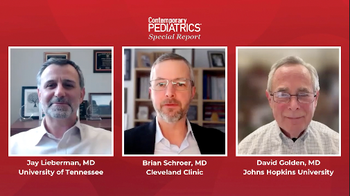
Journal Club: Maternal influenza vaccination benefits mother and child
The infant rate of influenza was reduced 63% among vaccined mothers.
Investigators assigned 340 pregnant women in Bangladesh to receive either inactivated influenza vaccine (intervention group) or the 23-valent pneumococcal polysaccharide vaccine (control group), then observed rates of influenza and other respiratory illness in all the mother-infant pairs for up to 24 months.
Among the 159 infants whose mothers received influenza vaccine, six had laboratory-confirmed influenza compared with 16 of the 157 infants whose mothers were in the control group. In addition to reducing the infant rate of influenza infection by 63%, influenza vaccine reduced infant respiratory illness with fever by 29%, infant clinic visits for respiratory illness with fever by 42%, and clinician testing for influenza by 49%. In addition, vaccinated mothers were significantly less likely than mothers in the control group to have respiratory illness with fever and had fewer clinic visits (Zaman K et al. N Engl J Med 2008:359:1555).
Commentary:
Dr. Burke, section editor for Journal Club, is Chairman of the Department of Pediatrics at Saint Agnes Hospital, Baltimore. He is a contributing editor for Contemporary Pediatrics. He has nothing to disclose in regard to affiliations with, or financial interests in, any organization that may have an interest in any part of this article.
Newsletter
Access practical, evidence-based guidance to support better care for our youngest patients. Join our email list for the latest clinical updates.



